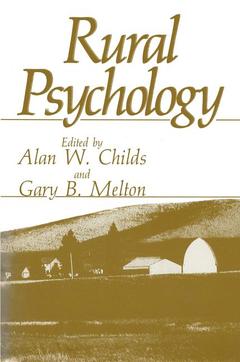Rural Psychology, Softcover reprint of the original 1st ed. 1983
Langue : Anglais
Coordonnateur : Childs Alan W.

1 Ruralness as a Psychological Construct.- Definitions of Rural.- Rural Values and Attitudes.- Manning Theory.- Isolation.- The Contents of This Volume.- References.- 2 Characteristics of Rural America.- Demographic Characteristics.- Definitions.- Population.- Geographic Distribution.- Education, Occupation, and Income.- Summary.- Rural Social Institutions.- Economy.- Government.- Education.- Family.- Rural Social Organization.- Rural Communities.- Rural-Urban Differences.- Social Discord in Rural Appalachian Communities.- Conclusions.- References.- 3 Interaction in Rural Families.- Characteristics of Rural Families.- Familism.- Analgesic Subculture Model.- Family Dominance Patterns.- Parenting.- Education.- Implications of Findings.- Familism.- Parenting.- Family Dominance Patterns.- Conclusions.- References.- 4 Cross-Cultural Research in Psychological Development in Rural Communities.- Cross-Cultural Findings on Rural-Urban Differences in Cognitive Growth.- Piagetian Research.- Sorting and Classification.- Memory Tasks.- Linguistic Development.- Summary.- Another View of Rural-Urban Differences.- Cognitive Development in Three Norwegian Subcultures.- Cognitive Development in Three Hungarian Subcultures.- Discussion: Rural and Urban Patterns of Development.- Norway and Hungary.- Conclusions.- References.- 5 Issues of Linguistic Development in Rural Subcultures in the United States.- The Basis of Difference.- Language Learning and Rural Subcultures.- Linguistic Structure.- Language Socialization.- Institutionalized Discontinuity.- Conclusion.- References.- 6 Is there a Psychology of the Rural Aged?.- What Is Rural? Who Are the Rural Aged?.- Deficiencies in Definitions of Rural Aged.- Differences between Rural and Nonrural Aged.- Independence, Dependence, and Isolation.- Need for and Availability of Services.- Housing.- Income.- How They See It.- Loneliness.- Is Rurality An Important Variable?.- Environments and Adaptations.- Understanding the Rural Aging.- References.- 7 Environmental Perception and Cognition in Rural Contexts.- Spatial Cognition.- Structural Elements of Cognitive Maps.- Variations in Cognitive Maps.- Spatial Cognition in Nonurban Settings.- Research Directions.- Perception of Natural Hazards.- Perception of Risk.- Choices in Response to Natural Hazards.- Research Directions.- Scenic Quality Analysis.- Scenic Quality Criterion Measures.- Predictors of Scenic Quality.- Related Issues.- Research Directions.- Concluding Remarks.- References.- 8 Locus of Control and the Rural Experience.- The Locus of Control Construct and Its Cognates.- The Shaping of Causal Expectancies and Their Ramifications.- Rural and Urban Settings.- Research on Locus of Control and Rural Life.- Conclusion.- References.- 9 Social Psychology and Religious Fundamentalism.- The Grounding of Fundamentalism.- Historical Considerations.- Where Are the Fundamentalists?.- Church Attendance and Religiosity.- Education and Religiosity.- Blessed Are the Poor?.- Liberalizing Factors.- Compassion and Prejudice.- Association Patterns.- Fundamentalism: Old or New?.- References.- 10 The Quality of Life in Rural and Urban America.- Subjective Indicators of Rural and Urban Quality of Life.- Objective Indicators of Rural and Urban Quality of Life.- Economic Indicators.- Services and Facilities.- Environmental Quality.- Social Indicators.- Conclusions.- References.- 11 Needs Assessments in Rural Areas: Issues and Problems.- Needs-Assessment Techniques.- Problem.- Desire.- Solution.- Needs Assessments in Rural Areas.- Problems in Rural Needs Assessments.- Reliability and Validity of Techniques.- Relation between Community Residents and Mental Health Professionals.- Conclusion.- References.- 12 Problems in Program Development and the Development of Alternatives.- Overview.- Background.- The Problem in the Process.- The Person.- The Rural Community Psychologist.- The Service Provider.- The Community Psychologist.- The Situation.- The Interactive Process.- The Development of Alternatives.- Paraprofessional and Volunteer Programs in Rural Areas.- The Development of Alternatives.- Implications for Future Directions.- Social-Communication Ecology.- Utilization of Rural Geography.- Training: Developing Alternatives.- The Rural Network: A Proposal.- Some Concluding Thoughts.- References.- 13 Models of Service Delivery.- Issues in Rural Service Delivery.- The Models.- Outpatient Clinical Services.- Emergency Services and Crisis Intervention.- Transitional Care.- Consultation.- Aftercare-Community Support Programs.- Mental Health Services in Primary Health Care.- The Model of Alternatives to Clinical Care.- The Characteristics of Alternative Care Contrasted with the Characteristics of Clinical Care.- Individual and Community Change.- References.- 14 Child Abuse: a Review with Special Focus on an Ecological Approach in Rural Communities.- Definitions of Child Abuse.- Child Abuse as a Psychiatric Problem.- Child Abuse as a Sociological Problem.- Societal, Institutional, and Familial Abuse.- Demographic Variables.- Effects of Stress.- Relationship between Social Isolation and Abuse.- Child Abuse as an Ecological Problem.- The Rural Context.- Linkages between Abusive Families and the Community.- Stress in the Rural Environment.- The Role of Family Support in the Rural South.- Rural Isolation.- Conclusion.- References.- 15 Home-Based Early Intervention.- Rationale.- The AEL Experiment.- Characteristics of Rural Appalachians.- Demographics: Then and Now,..- Inferred Child-Rearing Practices.- The Psychosocial Interior of the Family.- Generalizability to the Region.- HOPE: An Early Intervention Strategy.- Overview of Program Rationale and Strategy.- Contribution of Daily Television Series.- The Home-Visitor Role.- The Classroom or Group Experience.- Parent Participation and Reactions.- HOPE as Primary Prevention.- Immediate Program Effects.- Parent Involvement in Children’s Early Learning and Development.- Children’s Performance on Cognitive Measures.- Children’s Curiosity and Social Development.- Effects on “At-Risk” Children.- Enduring Program Effects: Long-Term Follow-Up.- Effect on Families.- Effects on Children’s School Performance.- Effects on Children’s Social and Emotional Adjustment.- Unanswered Questions.- Replication Phase and Kindergarten Comparison.- Selection of Sites.- Implementation Requirements and Process.- Results.- Summary of Study’s Scope and Effects.- Implications for Working with Rural Parents.- References.- 16 Community Psychology and Rural Legal Systems.- Problems of Rural Judicial Administration.- Familiarity.- Professional Recruitment and Training.- Lack of Social Services.- Summary.- Patterns of Rural Crime.- Implications for Community Psychology.- Dispute Processing in Rural Communities.- Implications for Community Psychology.- Legal Socialization in Rural Communities.- Implications for Community Psychology.- Summary.- References.- 17 The Energy Crisis and Behavioral Science: a Conceptual Framework for Large-Scale Intervention.- Why is Energy a Topic for Rural Psychology?.- An Interdisciplinary Large-Scale Framework.- Why Behavioral Science?.- Target Behaviors.- Behavioral Strategies: Antecedents.- Behavioral Strategies: Consequences.- Behavioral Applications.- Equipment Efficiency.- A Framework for Organizing Community Action.- References.- 18 Epilogue: Some Research Questions.- Methodological and Conceptual Issues.- Specific Areas of Research.- Family Interaction.- Cognitive and Linguistic Development.- Environmental Perception and Aesthetics.- Sense of Efficacy and Personal Control.- Service Delivery Issues.- Rural Psychology and Social Change.- Why a Rural Psychology?.- References.
Date de parution : 11-2011
Ouvrage de 442 p.
15.2x22.9 cm
Disponible chez l'éditeur (délai d'approvisionnement : 15 jours).
Prix indicatif 52,74 €
Ajouter au panierMots-clés :
© 2024 LAVOISIER S.A.S.



